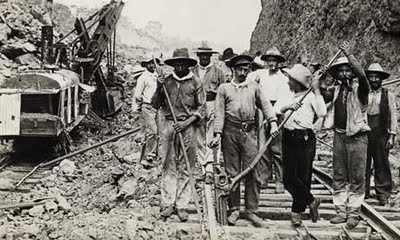Economist and Professor Robert Gordon has a bleak view of the future. It happens, in recessions, that we get bleaker. Here are his words from his recent work:
Since (Nobel Prize) Solow’s seminal work in the 1950s, economic growth has been regarded as a continuous process that will persist forever. But there was virtually no economic growth before 1750, suggesting that the rapid progress made over the past 250 years could well be a unique episode in human history rather than a guarantee of endless future advance at the same rate….
… The audacious idea that economic growth was a one-time-only event has no better illustration than transport speed. Until 1830 the speed of passenger and freight traffic was limited by that of “the hoof and the sail” and increased steadily until the introduction of the Boeing 707 in 1958. Since then there has been no change in speed at all and in fact airplanes fly slower now than in 1958 because of the need to conserve fuel…..
This is the one that I like the most (quoted also by Krugman):
…. A thought experiment helps to illustrate the fundamental importance of the inventions of IR #2 compared to the subset of IR #3 inventions that have occurred since 2002. You are required to make a choice between option A and option B. With option A you are allowed to keep 2002 electronic technology, including your Windows 98 laptop accessing Amazon, and you can keep running water and indoor toilets; but you can’t use anything invented since 2002.
Option B is that you get everything invented in the past decade right up to Facebook, Twitter, and the iPad, but you have to give up running water and indoor toilets. You have to haul the water into your dwelling and carry out the waste. Even at 3am on a rainy night, your only toilet option is a wet and perhaps muddy walk to the outhouse. Which option do you choose?
I have posed this imaginary choice to several audiences in speeches, and the usual reaction is a guffaw, a chuckle, because the preference for Option A is so obvious. The audience realizes that it has been trapped into recognition that just one of the many late 19th century inventions is more important than the portable electronic devices of the past decade on which they have become so dependent.
*
I leave beautiful Panama tonight after 3 days of stay. While watching the 1914 Canal I am imagining, on the other side, behind the trees, the workers deeply intent in the construction of the new channels, technologically advanced and to be delivered by 2014, that will almost double the capacity of trade compared to today’s. I am sure Robert Gordon would list this era as a new industrial revolution. For this country.
 I also imagine the workers that built the first channel, with the essential contribution of amazingly daring engineers and of the latest available equipment and machinery. It is as if these predecessors were watching them from above, listening to them sweating and laughing, I think out loud. They must understand their momentous and risky daily effort. Less risky than in the early XXth century, when conditions were so difficult that the lives of thousands were taken during the construction. They must be proud of their granchildren, now working on the new channels, working, as they did, to leave a trace of Man’s presence, pride, ingenuity, bravery. A trace of their passage on this earth.
I also imagine the workers that built the first channel, with the essential contribution of amazingly daring engineers and of the latest available equipment and machinery. It is as if these predecessors were watching them from above, listening to them sweating and laughing, I think out loud. They must understand their momentous and risky daily effort. Less risky than in the early XXth century, when conditions were so difficult that the lives of thousands were taken during the construction. They must be proud of their granchildren, now working on the new channels, working, as they did, to leave a trace of Man’s presence, pride, ingenuity, bravery. A trace of their passage on this earth.
Robert Gordon, again, would claim that both the United States and Europe do not have a canal to double so as to generate another industrial revolution. I don’t know if he is right, recessions are a bad time to think optimistically, only Keynes had the strength to do it in his essay written in the midst of the Depression, Economic Possibilities for our Granchildren. Let us just say that Gordon has chosen the safe path.
But one thing is sure. Whether we will grow for ever at 0.5% or 3% per year for the next century, our duty remains one of making sure that the short-term oscillations around that trend are minimized and recessions avoided. Recessions destroy the dignity of those workers that will never find a job again and of small entrepreneurs that are likely to give up forever on innovating after foreclosure and failure.
We know how to do that, we have instruments of economic policy for the job, and to ignore it, if not surprising (we have forgotten so many times the lessons of the past), would certainly be inexcusable.
13/09/2012 @ 00:34
Correct, by all means!
But the fact is that the policies followed by this european governance (and these subsidiary UEM governments) aim to anything but “avoiding” recession.
And to aknowledge their actual aims is the challenge we have to face as a token to our idea of democracy and hope…
13/09/2012 @ 14:17
Well, prof posted twice about Lee’s movie…seems he gave a pretty tough last warning on what would be his “right thing” choice “in case” (but the little bird in Washington was interesting too).
Fabius Maximus was Speedy Gonzales compared to prof Piga but I foresee promising developments.
A few months and I’llknow if I was right or not.